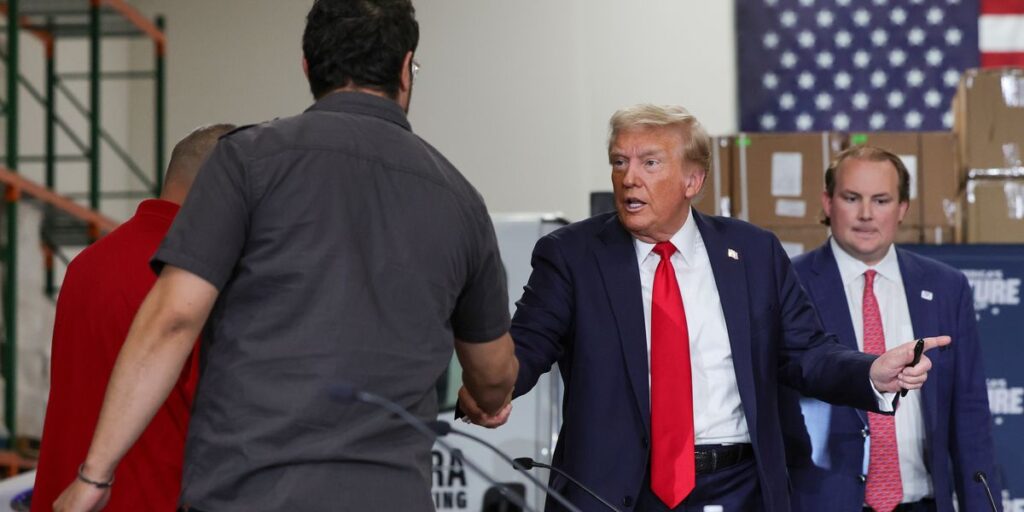In late September, Jesse Law, chair of the Clark County Republican Party, aimed to galvanize evangelical Christian volunteers by framing the Republican agenda in a faith-centric way as they prepared to canvass voters in Las Vegas. During his address, he highlighted a proposal to exempt workers’ tips from federal taxes, asserting that this solution resonates with the service workers who make up a significant portion of Nevada’s workforce. Law emphasized how tax issues sometimes evoke preconceived notions about political figures like Donald Trump or Kamala Harris, but he argued that those directly impacted by tip income see the practicality of such tax reforms. While this proposal does have roots in Trump’s recent interactions in the Vegas hospitality sector, it reflects broader Republican strategies to sway Nevada’s electorate, where hospitality jobs are prevalent, and public opinion is closely contested.
Trump’s push for a national no-tax-on-tips initiative comes amidst a competitive political landscape where he hopes to reclaim Nevada for the Republican Party—something that hasn’t happened since 2004. The idea aligns with a series of political maneuvers aimed at appealing to voters with straightforward tax proposals, such as ones aimed at Social Security and overtime. Critics, however, have labeled these proposals as superficial attempts to win votes, arguing that the complexity of tax policy requires more than just catchy slogans. Notably, Trump’s credibility on labor issues related to tips is questioned. During his presidential tenure, policies introduced by his administration were perceived as detrimental to tipped employees, thereby undermining trust in his newfound advocacy for their financial relief.
The Democratic response to Trump’s proposal has been both strategic and measured, especially when considering the support it garnered from the Culinary Union, which represents a large number of hospitality workers. Vice President Harris’s campaign stressed a more comprehensive plan focused not only on exempting tips from federal taxes but also on safeguarding against tax evasion by high earners. Furthermore, her platform proposes abolishing the subminimum wage for tipped employees, thereby attempting to establish a more equitable wage structure in the industry. Despite these ambitious promises, there are significant hurdles to enacting such policies successfully, especially regarding minimum wage increases—a politically charged issue met with resistance in the legislative arena.
Harris’s proposal contrasts with Republican Sen. Ted Cruz’s No Tax on Tips Act, which has simplified elements but lacks the protective measures to prevent exploitation by high-income earners. Critics argue that Cruz’s plan would ultimately serve wealthier individuals more than it would aid lower-earning workers. The complexity arises as higher earners could still benefit immensely from a tax exemption on tips, creating potential inequities in compensation structures across professions. As Democrats aim to counteract the appeal of such proposals, they are working to secure middle and lower-income voters who rely heavily on tips for their livelihoods while navigating the legislative intricacies involved.
The divide between the party lines reveals a nuanced understanding of voter sentiment, particularly among Latino voters in Nevada, who appear to favor Republicans on the issue of tipping policies more than their Democratic counterparts. Polls indicate that a significant percentage of Latino respondents find appeal in the “no tax on tips” measure. This advantage for Republicans demonstrates the potential risks for Democrats as they try to retain support not just within their traditional base, but also among key demographics that might feel overlooked by the party’s broader economic strategies. While Law asserts that Trump’s attempts to reach out to the service industry resonate with this electorate, Harris’s campaign is cautious not to overlook the importance of outreach and messaging tailored specifically to Nevada’s unique labor market.
In the shadow of these emerging proposals, engagement from local and national unions remains crucial. The Culinary Union’s endorsement of Harris affirms not only her approach toward tax reform but also reflects a desire for a more holistic solution to workers’ rights and compensation. With both parties scrambling to capture the hearts and minds of Nevada voters ahead of the election, the no-tax-on-tips debate exemplifies the convergence of economic policy and grassroots campaigning, underscoring how local issues can shape broader national narratives. As both sides position themselves to appeal to a swinging electorate, the proposed reforms will likely serve as a focal point for future discussions about taxation, workers’ rights, and the role of the hospitality industry in the state’s economy.
As the election unfolds, Nevada’s electorate will continue to weigh the implications of these proposals against their personal experiences and broader economic realities. The focus on tip taxation sheds light on significant labor trends and sparks greater discourse around fair wages, worker protections, and the influence of economic policies on everyday lives. Ultimately, the way this conversation develops will have lasting implications for both parties as they strive to articulate authentic narratives that resonate with voters who feel the direct effects of these proposed changes in their paychecks. The coming weeks will determine not only the effectiveness of these campaigns but also how the political landscape evolves in response to the needs and preferences of the people of Nevada.

